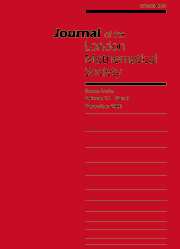Crossref Citations
This article has been cited by the following publications. This list is generated based on data provided by
Crossref.
Bergman, George M.
2005.
Direct limits and fixed point sets.
Journal of Algebra,
Vol. 292,
Issue. 2,
p.
592.
Khelif, Anatole
2006.
A propos de la propriété de Bergman.
Comptes Rendus. Mathématique,
Vol. 342,
Issue. 6,
p.
377.
Cornulier, Yves de
2006.
Strongly Bounded Groups and Infinite Powers of Finite Groups.
Communications in Algebra,
Vol. 34,
Issue. 7,
p.
2337.
Tolstykh, V. A.
2006.
Infinite dimensional general linear groups have finite width.
Siberian Mathematical Journal,
Vol. 47,
Issue. 5,
p.
950.
Bergman, George M.
2007.
Some results on embeddings of algebras, after de Bruijn and McKenzie.
Indagationes Mathematicae,
Vol. 18,
Issue. 3,
p.
349.
Rosendal, Christian
and
Solecki, Sławomir
2007.
Automatic continuity of homomorphisms and fixed points on metric compacta.
Israel Journal of Mathematics,
Vol. 162,
Issue. 1,
p.
349.
Kechris, Alexander S.
and
Rosendal, Christian
2007.
Turbulence, amalgamation, and generic automorphisms of homogeneous structures.
Proceedings of the London Mathematical Society,
Vol. 94,
Issue. 2,
p.
302.
Rosendal, Christian
2009.
A topological version of the Bergman property.
Forum Mathematicum,
Vol. 21,
Issue. 2,
Droste, Manfred
and
Truss, John K.
2009.
Uncountable cofinalities of automorphism groups of linear and partial orders.
Algebra universalis,
Vol. 62,
Issue. 1,
p.
75.
Droste, M.
and
Truss, J. K.
2011.
The uncountable cofinality of the automorphism group of the countable universal distributive lattice.
Demonstratio Mathematica,
Vol. 44,
Issue. 3,
p.
473.
Macpherson, Dugald
2011.
A survey of homogeneous structures.
Discrete Mathematics,
Vol. 311,
Issue. 15,
p.
1599.
Dolinka, Igor
and
Mašulović, Dragan
2012.
Properties of the automorphism group and a probabilistic construction of a class of countable labeled structures.
Journal of Combinatorial Theory, Series A,
Vol. 119,
Issue. 5,
p.
1014.
BARDAKOV, VALERY
TOLSTYKH, VLADIMIR
and
VERSHININ, VLADIMIR
2012.
GENERATING GROUPS BY CONJUGATION-INVARIANT SETS.
Journal of Algebra and Its Applications,
Vol. 11,
Issue. 04,
p.
1250071.
MALICKI, MACIEJ
2013.
Rooted trees, strong cofinality and ample generics.
Mathematical Proceedings of the Cambridge Philosophical Society,
Vol. 154,
Issue. 2,
p.
213.
Dolinka, Igor
2014.
The Bergman property for endomorphism monoids of some Fraïssé limits.
Forum Mathematicum,
Vol. 26,
Issue. 2,
p.
357.
Hyde, J.
Jonušas, J.
Mitchell, J. D.
and
Péresse, Y.
2016.
Universal sequences for the order-automorphisms of the rationals.
Journal of the London Mathematical Society,
Vol. 94,
Issue. 1,
p.
21.
Pech, Christian
and
Pech, Maja
2018.
Polymorphism clones of homogeneous structures: generating sets, Sierpiński rank, cofinality and the Bergman property.
Algebra universalis,
Vol. 79,
Issue. 2,
Coleman, Thomas D.H.
2020.
Two Fraïssé-style theorems for homomorphism–homogeneous relational structures.
Discrete Mathematics,
Vol. 343,
Issue. 2,
p.
111674.
Dowerk, Philip A.
2020.
Strong uncountable cofinality for unitary groups of von Neumann algebras.
Forum Mathematicum,
Vol. 32,
Issue. 3,
p.
773.
Schneider, Jakob
2020.
On groups with unbounded Cayley graphs.
Journal of Algebra,
Vol. 564,
Issue. ,
p.
317.


